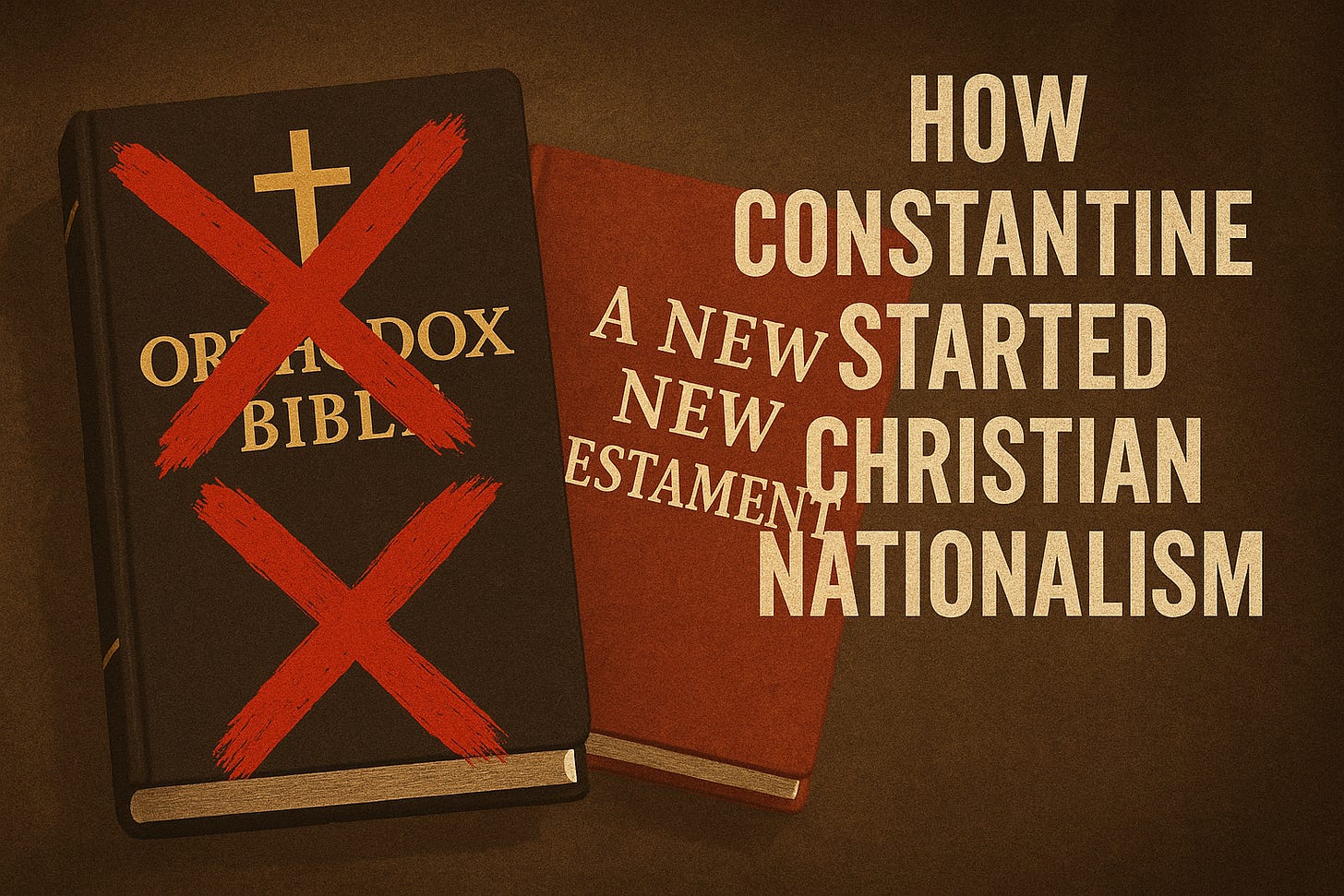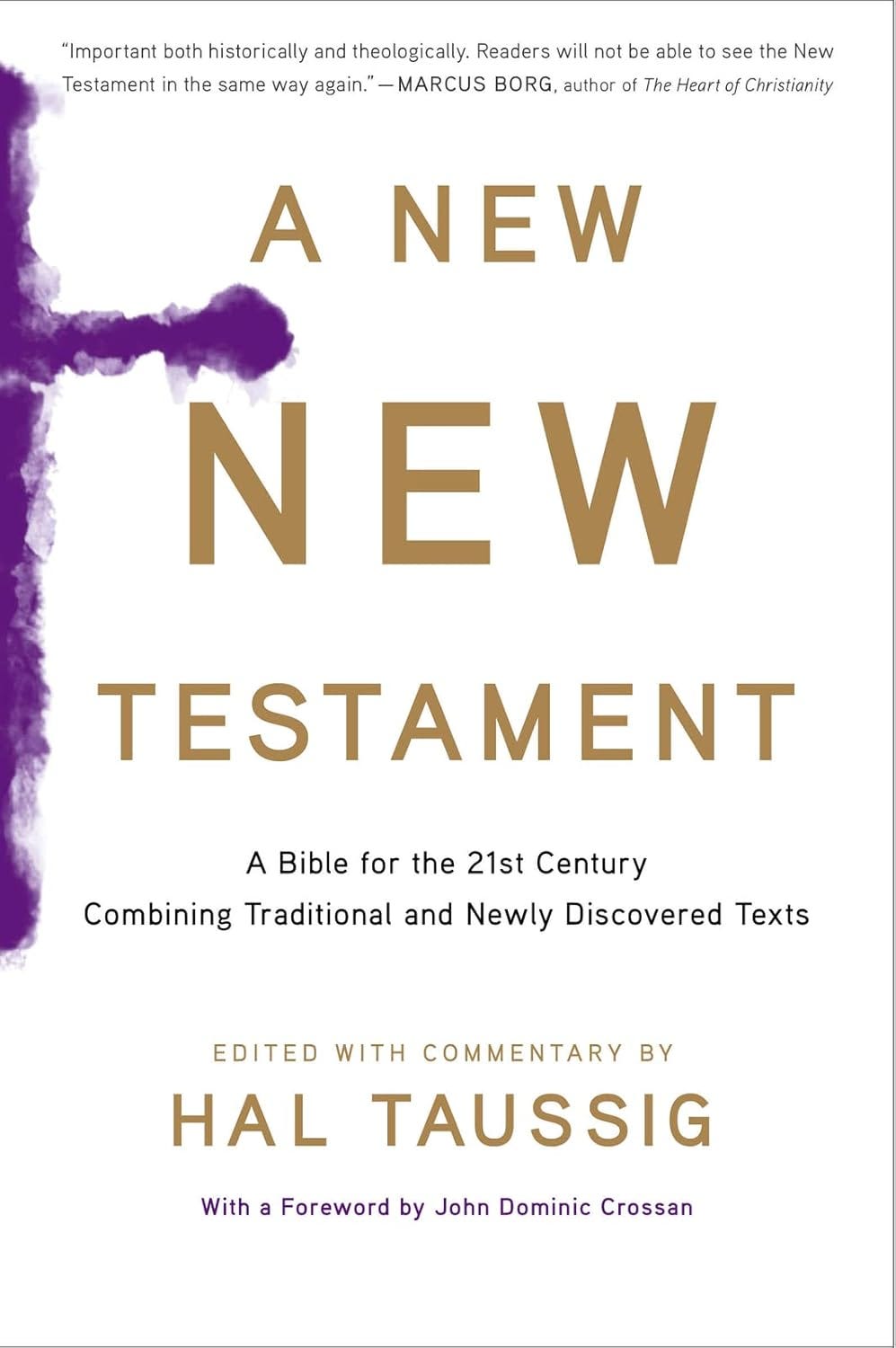The Empire’s Bible
How Constantine Laid the Foundations of Christian Nationalism by Weaponizing Scripture

Christianity Before Empire
In the early fourth century, Constantine changed the trajectory of Christianity—not by converting to its teachings, but by converting it into a tool of empire. What began as a diverse and often decentralized spiritual movement was consolidated into a state-sanctioned religion, aligned with imperial power and enforced orthodoxy. The result was not merely political patronage. It was the deliberate creation of a theological system built to serve the interests of the Roman state. Christian Nationalism did not begin in modern America—it began when Constantine made Christianity serve the empire.
Before Constantine, Christianity was not a monolith. Dozens of communities existed across the Mediterranean, many with their own texts, rituals, and leadership structures. Some revered the Gospel of Mary, which portrayed Mary Magdalene as a teacher of the male apostles. Others circulated the Gospel of Thomas, a collection of Jesus’ sayings that emphasized direct, interior revelation. The Acts of Paul and Thecla featured a woman baptizing herself and preaching publicly. These communities were diverse in structure and belief, often emphasizing spiritual equality, mysticism, and resistance to hierarchical control.
Constantine’s Political Conversion
That changed after Constantine’s so-called conversion. At the Council of Nicaea in 325 CE and in subsequent synods, he offered official endorsement and protection to one faction of Christian bishops—those aligned with a rigid, male-dominated, doctrinal authority. He did not settle theological disputes through spiritual discernment. He backed one side and criminalized the other. The favored bishops declared rival texts heretical. They banned their circulation, exiled their authors, and burned what they could find. Their decisions had nothing to do with historical accuracy or spiritual depth—they were strategic moves to establish a singular, enforceable version of the faith.
The Making of the Orthodox Canon
The formation of the The traditional New Testament canon (as finalized under imperial authority)—the set of 27 New Testament books still in use today—was shaped in that context. It was assembled by a small group of men under imperial favor, with political and theological uniformity as the priority. Women were excluded from the process. So were entire communities of believers whose voices no longer aligned with the imperial church. The canon that emerged did not reflect the full diversity of early Christianity. It reflected the consolidation of power.
The Rediscovery of the Erased
For centuries, the excluded texts were lost, buried, or forgotten. That changed in the 20th century with the discovery of the Nag Hammadi library in Egypt in 1945, along with other archaeological finds that unearthed early Christian writings long believed destroyed. These documents—often dismissed by the Church as heretical—offered a glimpse into the wide-ranging beliefs and practices of early Christians before orthodoxy was enforced by the state. In response to these discoveries, a council of nineteen scholars and spiritual leaders from various traditions came together in the early 2000s to produce A New New Testament, edited by Hal Taussig. This group included Protestant and Catholic theologians, progressive pastors, Jewish rabbis, and interfaith leaders. Their goal was not to replace scripture, but to restore voices that had been silenced—not by God, but by empire.
The Cost of Clinging to the Imperial Canon
The version of Christianity that survived was not necessarily the most authentic—it was the one that was armed, funded, and shielded by Rome. That canon was translated, adapted, and codified into modern versions like the King James Bible. To this day, many churches continue to treat it as the final and unquestionable standard. But doing so means continuing to uphold a framework born out of suppression, exclusion, and state control.
If your church still clings to the The traditional New Testament canon (as finalized under imperial authority) as the only valid scripture—while ignoring the suppressed texts preserved in collections like A New New Testament—you are not preserving Christian tradition. You are preserving the theological infrastructure of Christian Nationalism.
If You Want Liberation, Start with Your Sources
Let’s be clear: Christian Nationalism did not begin with MAGA hats or Supreme Court appointments. It began the moment Constantine offered political legitimacy to a narrow band of bishops, and they responded by outlawing their rivals and rewriting the boundaries of the faith. It began when scripture was weaponized to unify empire—not liberate the soul.
You cannot oppose Christian Nationalism while defending the very canon it was built upon. You cannot claim to affirm women, LGBTQ+ people, or marginalized communities while rejecting the texts that gave them voice. And you cannot call your church progressive if it is still governed by a list of scriptures chosen to serve the ambitions of a Roman emperor.
If you want a different kind of faith, you need to start with a different foundation.
Ready to See What Empire Tried to Erase?
If you’ve never read A New New Testament, now is the time.
This collection includes ten early Christian texts that were banned, buried, or forgotten—curated alongside the traditional canon by a diverse council of theologians, rabbis, pastors, and spiritual leaders. It doesn’t ask you to throw out your Bible. It asks you to reckon with what was deliberately excluded.
Reading it won’t just change what you think about the Bible.
It will change what you think Christianity was ever meant to be.
👉 Buy A New New Testament on Amazon
Update 8/2/2025
Here are some of the Christian Nationalist Laws were used by the Church that created the traditional New Testament.
1. Codex Theodosianus (Theodosian Code)
One of the clearest sources for imperial suppression of non-Nicene Christianity. Compiled under Theodosius II in the 5th century, it codifies laws going back to Constantine and Theodosius I.
➤ Example: Codex Theodosianus 16.5.6 (AD 379, Gratian, Valentinian II, and Theodosius I):
“All heresies are forbidden to hold meetings in private houses. If they attempt to do so, the houses themselves shall be confiscated to the public treasury.”
That’s a direct criminalization of house worship outside imperial orthodoxy.
2. Theodosius I – Edict of Thessalonica (Cunctos Populos), AD 380
This infamous law made Nicene Christianity the only legal form of Christianity:
“We desire that all peoples… shall profess the faith… delivered to the Romans by the divine Apostle Peter… This is the faith that we desire all to adopt. The rest… we consider heretical and foolish; their assemblies shall not receive the name of churches.”
This was the theological legal groundwork for suppression—once Nicene orthodoxy became official, all others were subject to legal sanction.
3. Letter of Ambrose of Milan to Valentinian II (circa 385–386)
Ambrose urges the emperor not to hand over a church building to Arians, calling it a betrayal of “the faith of the apostles.” He defended state-sanctioned Christian spaces and opposed giving even a corner to those deemed heretical.
“Shall I then surrender the temple of God? Shall I abandon it to the heretics? It is not lawful for me; nor ought I to do it.”
While not a legal text, it reflects how imperial-backed bishops claimed exclusive rights to worship space—and implied house worship would be treated the same.
4. Augustine’s Campaign against the Donatists (early 5th century)
Though slightly later, Augustine supported Roman enforcement against the Donatist sect, which often met in homes and had their own bishops.
He justified using state violence to suppress "error":
“It is better that they be brought to salvation through fear of punishment than that they be allowed to fall into ruin.”
Augustine’s logic was later codified into law.
5. Council Canons Against Unauthorized Assemblies
Council of Laodicea (c. 363–364 AD), Canon 6:
“No one shall be allowed to set up a separate church without the bishop's authority.”
This clearly aimed to shut down independent gatherings, many of which were held in private homes.
Summary:
By the end of the 4th century, the pattern is clear:
Only Nicene-aligned Christianity could legally meet.
Private house worship by "heretics" was banned and punished.
Bishops were empowered to enforce control over all Christian gatherings.
So yes, house churches were legal at first. But once orthodoxy became law, they were treated like a threat to imperial order and seized or destroyed.
Again, the traditional New Testament was put together by these thugs. Not only did they ban other valid books, they also corrupted the Texts to match their oral tradition.
Conclusion
The New Testament canon is less the product of divine consensus and more the result of imperial power consolidating a state-approved version of Christianity. In the 4th century, Constantine and his successors weren’t just trying to unify doctrine—they were using religion to stabilize a fragile empire. That meant exiling dissenters, banning gospels that didn’t toe the line, and elevating one version of Jesus while erasing others. The Council of Nicaea didn’t settle theological debates through prayerful discernment—it used imperial authority to define orthodoxy by decree. This wasn’t spiritual unity; it was theological monopoly enforced by law.
Christian Nationalism today runs on the same operating system. It doesn’t want freedom of religion—it wants state-aligned religion. It doesn’t honor the teachings of Jesus—it weaponizes a narrow, sanitized version of him for political control. And just like in the 4th century, it’s not about faith. It’s about power.
I am an Amazon Affiliate and use affiliate links in my articles. That means I may get a small kickback if you decide to purchase something after going through one of my links. Shopping on Amazon through my links is a great way for you to support my work and mission, and it doesn’t cost you anything extra.
If this post unhinged your halo, poured some Presence in your posture, or made your inner heretic weep with joy—share it, toss a coin to your scribal renegade, or subscribe for more molten reflections from the margins.




I'm looking forward to reading this. And I'm excited that the foreword is by John Dominic Crossan because I've enjoyed listening to his commentaries on various parts of the Bible over the years. Celebrating the feast day of Constantine and Helen is a huge deal in the Orthodox Church, "equal to the apostles." The more I think about that now that I'm no longer Orthodox, the emperor would be considered equal to the apostles, but Christianity should never have been equal to or subsumed by empire.
Had no idea this existed. Surprise! Now i have 5 new books to read & after that i’m sure you’ll have some other gems to share.
I have much to learn & while there are usually some strong emotions erupting during the process itz better than hiding in the dark & having those same emotions with no guidance or support to help you on the adventure & journey. 🌈